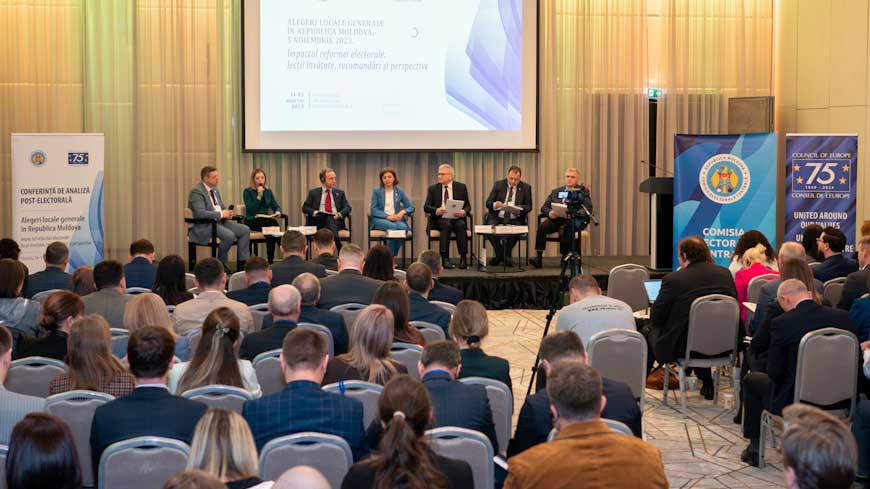The impact of the electoral reform, lessons learned, follow-up recommendations and steps ahead were discussed on 14-15 March 2024, at the Post-Election Analysis Conference organised following the 5 November 2023 General Local Elections in the Republic of Moldova. The Conference was organised by the Council of Europe Office in Chisinau, in partnership with the Central Electoral Commission of the Republic of Moldova.
The Conference gathered around 160 policy and lawmakers, representatives of the public institutions, political parties, international community, civil society, media, as well as members of the international and local observation missions who discussed and analysed the context in which the General Local Elections were held, including from an institutional, legal and gender point of view.
Falk Lange, Head of the Council of Europe Office in Chisinau, stated that „the Conference discussions and conclusions will help Moldovan authorities to ensure that Moldovan citizens can better exercise their right to vote and to stand for elections freely wherever they reside. It is a platform to highlight the first outcomes of the electoral reform started with the adoption of the Electoral code of 22 December 2022.”
Angelica Caraman, Chairwoman of the Central Electoral Commission (CEC), stated that „the general local elections of November 2023 were held on the basis of a new Electoral Code, new rules. There are no perfect electoral process, but given the current challenges facing democracy around the world, it is more important than ever to work harder to deliver credible and inclusive elections. An effective post-electoral review process is an essential step towards the next elections, allowing the process to be improved and developed, and avoiding the repetition of the same mistakes".
During the conference, international and national experts, as well as international and domestic observers actively discussed about alternative voting methods, certification of electoral officials, digitalisation of electoral processes, implementation of the recommendations issued by the international electoral observation missions on amendments to the legal framework, strengthening of the CEC capacities to oversee political party financing, combating hate speech and sexism, electoral dispute resolution, unbiased coverage of the electoral campaigns by media, and other important election-related issues.
The Conference represents an additional opportunity to continue work in implementing and promoting democratic standards and good practices in the electoral field, in line with the Council of Europe values and standards, and the Conference outcomes are, especially, important in the context of organising the 2024 presidential elections and 2025 parliamentary elections and, in the context of implementation of the Agenda of the Republic of Moldova to adherence to the European Union.
In concluding remarks, Franck Daeschler, Co-ordinator, Elections Programme, Parliamentary and Electoral Cooperation Division, Parliamentary Assembly of Council of Europe, expressed his appreciation to the CEC leadership and all partners involved in the organisation of the summing-up event, stressing that, in the process of preparing the new Council of Europe Action Plan for the Republic of Moldova 2025-2028, the results of this conference will play a major role in feeding discussions on the electoral field, which is a priority for the Council of Europe.
The Conference was organized in the framework of the Project ”Improving electoral practice in the Republic of Moldova (IEPRM), Phase III”, part of the Council of Europe Action Plan for the Republic of Moldova 2021-2024.





